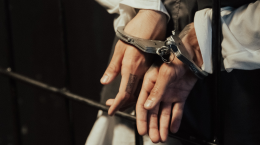Article 328 of the Criminal Code, it would seem, is far from politics. After all, suspects in the distribution of drugs can be both those who consider themselves the opposition and those who support Lukashenka’s policy. Now, several political prisoners in jail have received sentences under Article 328 of the Criminal Code. In this article, we will tell you about them.
Lukashenka has repeatedly called the protesters drug addicts. On August 10, 2020, speaking about the detentions of protesters, he said: “We detained the organizers who were hiding, running around the corner. About three thousand, half of them in Minsk. Stoned. There are a lot of drunks. With drugs. The horror.” In October 2020, the illegitimate dictator noted that he had given the security forces an order to pull “drug addicts” out of apartments: “Is it normal when a crowd drunk, distraught, pierced with drugs, smoked and soaked – hundreds of people rushed to these areas? What should the police have done? It was my order to keep people safe.” Maybe this is where the tradition of sentencing political prisoners also started under article 328.
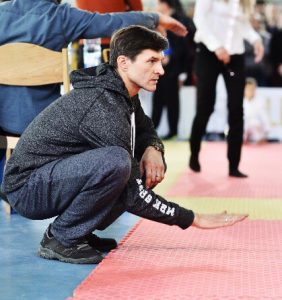 On September 29, 2020, the police arrested Anton Bykovsky, a 39-year-old karate coach. He got accused that he and four other associates damaged the car of a policeman – the deputy head of the department of organization of operational-regime work of the Department of Execution of Punishments, Alexander Geitz. According to the charge, the men punctured the tires, foamed the doors with mounting foam and filled the body with paint. During the search, the police found in Anton Bykovsky’s house illegally planted cannabis. He was accused of growing a narcotic substance in his garage and also storing it at home. Anton partially admitted guilt under articles 328 and 339 of the Criminal Code. During the arrest, Anton was beaten and forced to record a confession on camera, which appeared in the Telegram channel of the state ONT. Anton appeared in front of the audience in blood. On February 3, 2021, Anton Bykovsky was sentenced to 6 years in prison – among the other defendants, in this case, he received the longest sentence.
On September 29, 2020, the police arrested Anton Bykovsky, a 39-year-old karate coach. He got accused that he and four other associates damaged the car of a policeman – the deputy head of the department of organization of operational-regime work of the Department of Execution of Punishments, Alexander Geitz. According to the charge, the men punctured the tires, foamed the doors with mounting foam and filled the body with paint. During the search, the police found in Anton Bykovsky’s house illegally planted cannabis. He was accused of growing a narcotic substance in his garage and also storing it at home. Anton partially admitted guilt under articles 328 and 339 of the Criminal Code. During the arrest, Anton was beaten and forced to record a confession on camera, which appeared in the Telegram channel of the state ONT. Anton appeared in front of the audience in blood. On February 3, 2021, Anton Bykovsky was sentenced to 6 years in prison – among the other defendants, in this case, he received the longest sentence.
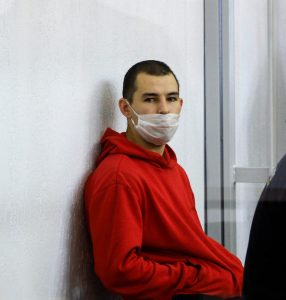 25-year-old Vladislav Gulis was detained on October 22, 2020, for writing the words “We will not forget” on the asphalt near the memorial to the deceased protester Alexander Taraykovsky on September 9. Before his arrest, Vladislav worked as a car wash. The guy got charged under part 2 of Article 339 (hooliganism) and part 2 of Article 218 of the Criminal Code (intentional destruction or damage to property committed in a socially dangerous way that caused damage on a large scale). Earlier, Vladislav got a sentence under part 3 of Article 328 of the Criminal Code. This criminal record was not repaid, which became another factor for assigning him a two-year sentence. State Prosecutor Alina Kasyanchik noted in court that Vladislav did not embark on the path of correction and inflicted “a cynical inscription insulting the feelings of citizens, demonstrating disregard for moral values, aimed at harming public order.” Vladislav did not admit his guilt, stating that the author of the writing was another person. And he only told him how to write the inscription so that less paint would go away. In addition, the guy did not see any insults in the text “let’s not forget”. Despite this, Vladislav got two years in prison.
25-year-old Vladislav Gulis was detained on October 22, 2020, for writing the words “We will not forget” on the asphalt near the memorial to the deceased protester Alexander Taraykovsky on September 9. Before his arrest, Vladislav worked as a car wash. The guy got charged under part 2 of Article 339 (hooliganism) and part 2 of Article 218 of the Criminal Code (intentional destruction or damage to property committed in a socially dangerous way that caused damage on a large scale). Earlier, Vladislav got a sentence under part 3 of Article 328 of the Criminal Code. This criminal record was not repaid, which became another factor for assigning him a two-year sentence. State Prosecutor Alina Kasyanchik noted in court that Vladislav did not embark on the path of correction and inflicted “a cynical inscription insulting the feelings of citizens, demonstrating disregard for moral values, aimed at harming public order.” Vladislav did not admit his guilt, stating that the author of the writing was another person. And he only told him how to write the inscription so that less paint would go away. In addition, the guy did not see any insults in the text “let’s not forget”. Despite this, Vladislav got two years in prison.
 On December 21, 2020, Sergey Monich, a resident of Zaslavl, the father of two minor children, was detained. Sergey was tried on April 2, 2021, for writing “Riot police-murderers” and “3%” (part 1 of Article 339 of the Criminal Code) and for writing “Kubrakov is a fascist” (Article 369 of the Criminal Code). The court considered that by calling Interior Minister Ivan Kubrakov, a fascist, Sergey Monich insulted him. In addition, Sergey received two years under part 1 of Article 328 for possession and transportation of marijuana weighing 0.1 g without a marketing purpose. The whole term for a political prisoner was three years. Even the possession of such a small amount of drugs in Belarus belongs to severe crimes. Perpetrators are usually punished with restriction of liberty without referral to a correctional institution. If a person has been previously convicted or has other crimes (as in Sergey’s case), this period will increase.
On December 21, 2020, Sergey Monich, a resident of Zaslavl, the father of two minor children, was detained. Sergey was tried on April 2, 2021, for writing “Riot police-murderers” and “3%” (part 1 of Article 339 of the Criminal Code) and for writing “Kubrakov is a fascist” (Article 369 of the Criminal Code). The court considered that by calling Interior Minister Ivan Kubrakov, a fascist, Sergey Monich insulted him. In addition, Sergey received two years under part 1 of Article 328 for possession and transportation of marijuana weighing 0.1 g without a marketing purpose. The whole term for a political prisoner was three years. Even the possession of such a small amount of drugs in Belarus belongs to severe crimes. Perpetrators are usually punished with restriction of liberty without referral to a correctional institution. If a person has been previously convicted or has other crimes (as in Sergey’s case), this period will increase.
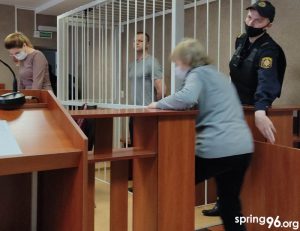 On May 6, 2021, a 45-year-old father of four children, Sergey Sikorsky, was sentenced. He was tried under part 2 of Article 293 of the Criminal Code (participation in mass riots) and parts 1 and 3 of Article 328 (possession and sale of drugs). On August 11, 2020, Sergey was in the city during a protest rally. He was on publicly available photos. Sergey said he did not participate in the riots and left after hearing that the riot police were approaching. When he was leaving, he saw how the security forces were beating peaceful Belarusians. He decided to intercede – but he could only throw a stone at the glass of a police minibus. For these actions, Sergey was detained in September 2020. The analyses showed mephedrone in his organism. Traces of the substance were in the apartment. Then the investigation found that the political prisoner resold part of the narcotic substance to his wife’s friend in the summer and charged him with selling drugs. Sergey worked two jobs to provide for his family. The political prisoner was sentenced to 9 years in prison and fined 8,700 rubles. Only the punishment under Article 328 of the Criminal Code “pulled” for seven years of imprisonment.
On May 6, 2021, a 45-year-old father of four children, Sergey Sikorsky, was sentenced. He was tried under part 2 of Article 293 of the Criminal Code (participation in mass riots) and parts 1 and 3 of Article 328 (possession and sale of drugs). On August 11, 2020, Sergey was in the city during a protest rally. He was on publicly available photos. Sergey said he did not participate in the riots and left after hearing that the riot police were approaching. When he was leaving, he saw how the security forces were beating peaceful Belarusians. He decided to intercede – but he could only throw a stone at the glass of a police minibus. For these actions, Sergey was detained in September 2020. The analyses showed mephedrone in his organism. Traces of the substance were in the apartment. Then the investigation found that the political prisoner resold part of the narcotic substance to his wife’s friend in the summer and charged him with selling drugs. Sergey worked two jobs to provide for his family. The political prisoner was sentenced to 9 years in prison and fined 8,700 rubles. Only the punishment under Article 328 of the Criminal Code “pulled” for seven years of imprisonment.
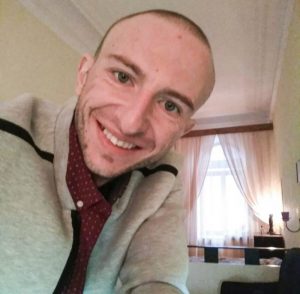 On July 7, 2021, 35-year-old Yevgeny Semenov was tried in Minsk. He was accused of insulting the employees of GUBOPiK Ivan Tarasik and Alexander Alyoksa with comments in Telegram chat and threats to them (Articles 364 and 369 of the Criminal Code). In addition, Evgeny became accused of 11 episodes of theft (parts 1 and 2 of Article 205 of the Criminal Code), which he committed while drunk. And he was also tried for evading serving a sentence (restriction of liberty for four years) under Article 328 of the Criminal Code. According to the investigation, Yevgeny repeatedly evaded serving his sentence, changed his place of residence and did not report to the police, did not appear at the inspection, for which he received reprimands and 15 days of isolation. And when checking, he was found drunk in the apartment. Yevgeny also said that he violated the regime only once when he was admitted to the hospital. By the way, while he was in the department, the police checked his phone and convicted him under Article 23.34 of the Administrative Code for participating in an unauthorized mass event. It happened because of a photo of a group of riot police – however, Yevgeny said he photographed the security forces from the cafe, where he was sitting window. Yevgeny Semenov got a sentence of five years in prison. He fully admitted his guilt. He was ordered to pay 3,000 rubles to each security officer.
On July 7, 2021, 35-year-old Yevgeny Semenov was tried in Minsk. He was accused of insulting the employees of GUBOPiK Ivan Tarasik and Alexander Alyoksa with comments in Telegram chat and threats to them (Articles 364 and 369 of the Criminal Code). In addition, Evgeny became accused of 11 episodes of theft (parts 1 and 2 of Article 205 of the Criminal Code), which he committed while drunk. And he was also tried for evading serving a sentence (restriction of liberty for four years) under Article 328 of the Criminal Code. According to the investigation, Yevgeny repeatedly evaded serving his sentence, changed his place of residence and did not report to the police, did not appear at the inspection, for which he received reprimands and 15 days of isolation. And when checking, he was found drunk in the apartment. Yevgeny also said that he violated the regime only once when he was admitted to the hospital. By the way, while he was in the department, the police checked his phone and convicted him under Article 23.34 of the Administrative Code for participating in an unauthorized mass event. It happened because of a photo of a group of riot police – however, Yevgeny said he photographed the security forces from the cafe, where he was sitting window. Yevgeny Semenov got a sentence of five years in prison. He fully admitted his guilt. He was ordered to pay 3,000 rubles to each security officer.
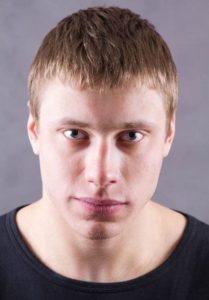 There are also those among the political prisoners for whom the long-standing accusation under article 328 has become an aggravating circumstance. One of them is Sergey Vereshchagin, detained on August 12, 2020. That day, he saw from the window how the police were beating people on the street, shouted at the security forces from the window and threw a plastic bottle at them. Sometime later, police broke into his apartment and beat him to blood. The police did not provide medical assistance to Sergey Vereshchagin. Before the trial – and it began in November 2020 – Sergey retained speech disorders and pain. The political prisoner was sentenced to five years in prison under Article 364 of the Criminal Code (violence against a police officer) and sent to PC-13. Sergey’s previous criminal record (a term under part 1 of Article 328 of the Criminal Code) influenced the court decision.
There are also those among the political prisoners for whom the long-standing accusation under article 328 has become an aggravating circumstance. One of them is Sergey Vereshchagin, detained on August 12, 2020. That day, he saw from the window how the police were beating people on the street, shouted at the security forces from the window and threw a plastic bottle at them. Sometime later, police broke into his apartment and beat him to blood. The police did not provide medical assistance to Sergey Vereshchagin. Before the trial – and it began in November 2020 – Sergey retained speech disorders and pain. The political prisoner was sentenced to five years in prison under Article 364 of the Criminal Code (violence against a police officer) and sent to PC-13. Sergey’s previous criminal record (a term under part 1 of Article 328 of the Criminal Code) influenced the court decision.
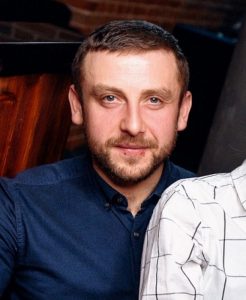 Businessman Viktor Borushko, sentenced to five years in prison on January 27, 2021, also had a criminal record under Article 328 of the Criminal Code. And even though it was 15 years before the new trial, the term partly influenced the verdict. Viktor got accuse of intentionally causing grievous bodily harm to a person in connection with his official activities (paragraph 5 of part 2 of Article 147 of the Criminal Code). On October 18, 2020, Viktor got detained in Minsk at a protest march. He started to run away from the security forces, but soon he was knocked down, and together with a riot police officer, he fell to the ground. As a result, a special forces soldier received a hip fracture. Viktor did not admit his guilt in this, saying that he was a victim of the arbitrariness of the police. In the police department, they marked him with red spray paint. Then they beat him and raped him with a baton. The 32-year-old entrepreneur spent more than ten days in the hospital after his arrest. Viktor Borushko got sentenced to five years of imprisonment in a high-security regime.
Businessman Viktor Borushko, sentenced to five years in prison on January 27, 2021, also had a criminal record under Article 328 of the Criminal Code. And even though it was 15 years before the new trial, the term partly influenced the verdict. Viktor got accuse of intentionally causing grievous bodily harm to a person in connection with his official activities (paragraph 5 of part 2 of Article 147 of the Criminal Code). On October 18, 2020, Viktor got detained in Minsk at a protest march. He started to run away from the security forces, but soon he was knocked down, and together with a riot police officer, he fell to the ground. As a result, a special forces soldier received a hip fracture. Viktor did not admit his guilt in this, saying that he was a victim of the arbitrariness of the police. In the police department, they marked him with red spray paint. Then they beat him and raped him with a baton. The 32-year-old entrepreneur spent more than ten days in the hospital after his arrest. Viktor Borushko got sentenced to five years of imprisonment in a high-security regime.
Due to the anti-drug decree, issued in 2014, Article 328 is considered almost one of the most severe. Just think: it is realistic to get 10, 12, or even 16 years in prison. It’s scary to write this, but even for the murder of a person, Belarusian courts can give less – from 6 to 15 years. Moreover, under Article 328 of the Criminal Code, they are often accused without evidence – and this is the worst. Punishment for drug possession is a reason to put a person in jail for a more extended time. So, he will have to work for the state for free longer. A fair court of Belarus without Lukashenka will never allow such lawlessness.


